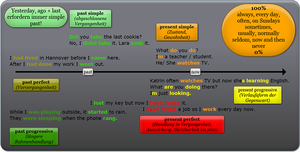Present Simple/Formen von "to be": Unterschied zwischen den Versionen
(+ Vorlage:Taste) Markierung: Quelltext-Bearbeitung 2017 |
(+Quiz) Markierung: Quelltext-Bearbeitung 2017 |
||
| Zeile 1: | Zeile 1: | ||
Im Deutschen werden alle Verben {{wpde|Konjugation (Grammatik)|konjugiert}}, d.h. je nach Geschlecht, Anzahl und Zeit verändert. Im Englischen gibt es nur das ''he,she,it-s'' | Im Deutschen werden alle Verben {{wpde|Konjugation (Grammatik)|konjugiert}}, d.h. je nach Geschlecht, Anzahl und Zeit verändert. Im Englischen gibt es nur das ''he,she,it-s''. | ||
Nur das '''Verb "''to be''"''' hat auch im [[Englisch/Grammatik/Tenses/Present Simple|Present Simple]] mehrere Formen (''am'', ''is'', ''are''). | |||
Zur besseren Übersicht sind in der Tabelle die [[Pronouns#Subject_Pronouns|Personalpronomen]] vor die jeweilige Verbform gestellt: | Zur besseren Übersicht sind in der Tabelle die [[Pronouns#Subject_Pronouns|Personalpronomen]] vor die jeweilige Verbform gestellt: | ||
| Zeile 78: | Zeile 79: | ||
"But Mummy, I ''am (???)'' the only (hier: =einzige) boy who isn't allowed." }} | "But Mummy, I ''am (???)'' the only (hier: =einzige) boy who isn't allowed." }} | ||
=== short answers === | |||
'''Don't answer just "Yes!" or "No." Write short answers:''' | |||
<div class="lueckentext-quiz" lang="en"> | |||
1. Are these people your parents? - Yes, <em>they are</em>. | |||
2. Is your mother a teacher? – No, <em>she isn't</em>. | |||
3. Am I in your class, Jessie? – Yes, <em>you are</em>. | |||
4. Have you got your homework? - Yes, <em>I have</em>. | |||
5. Is your pencil sharp <span class="kursiv">(spitz)</span>? – No, <em>it isn't</em>. | |||
6. Is David a boy? – Yes, <em> he is</em>. | |||
</div> | |||
'''Don't answer just "Yes!" or "No." Write short answers:''' | |||
<div class="lueckentext-quiz" lang="en"> | |||
1. Are your parents untidy? – Yes, <em> they are()</em>. | |||
2. Is Mr Scharwies our English teacher? – Yes, <em> he is()</em>. | |||
3. Is your sister at this school? – Yes, <em>she is()</em>. | |||
</div> | |||
{{Fortsetzung|weiter=He, | {{Fortsetzung|weiter=He, she, it …<br>(3. Person Singular)|weiterlink=Englisch/Grammatik/Tenses/Present_Simple/He,_she,_it_...|vorher=Present Simple<br>(Übersicht)|vorherlink=Englisch/Grammatik/Tenses/Present_Simple}} | ||
Version vom 14. Oktober 2020, 12:36 Uhr
Im Deutschen werden alle Verben konjugiert![]() , d.h. je nach Geschlecht, Anzahl und Zeit verändert. Im Englischen gibt es nur das he,she,it-s.
, d.h. je nach Geschlecht, Anzahl und Zeit verändert. Im Englischen gibt es nur das he,she,it-s.
Nur das Verb "to be" hat auch im Present Simple mehrere Formen (am, is, are).
Zur besseren Übersicht sind in der Tabelle die Personalpronomen vor die jeweilige Verbform gestellt:
| Singular (Einzahl) | Plural (Mehrzahl) | |
|---|---|---|
| 1.Person | I am | we are |
| 2. Person | you are | you are |
| 3. Person | he, she, it is | they are |
Interactive Exercises
Put the correct form of the verb "to be" into the gaps:
I am Cindy. That is Mandy. We are twelve.
Robert is fifteen. The house is blue. They are in London.
I am fourteen. Today is Tuesday.
Write the correct form of the verb "to be" into the gaps:
The bike is (be) blue. The tree is (be) green. The Burtons are (be) in London.
The room is (be) black. I am (be) a pupil.
The pupils are (be) nervous, because they write a test.
The people are (be) in front of the house.
A genius is (be) a very clever person. Snow is (be) white. We are (be) in a class.
The bike is (be) blue. The tree is (be) green. The Burtons are (be) in London.
The room is (be) black. I am (be) a pupil.
The pupils are (be) nervous, because they write a test.
The people are (be) in front of the house.
A genius is (be) a very clever person. Snow is (be) white. We are (be) in a class.
Write the correct form of the verb "to be". Sometimes you need the negative!
Becky is (???) twelve. Robert isn't|is not (???) twelve but thirteen!.
Sarah and David are(???) both (=beide) eleven years old.
"You want to see a horror movie? - No way, you are (???)' only (=nur) twelve, you aren't|are not(???) old enough!"
"But Mummy, I am (???) the only (hier: =einzige) boy who isn't allowed to go."
Sarah and David are(???) both (=beide) eleven years old.
"You want to see a horror movie? - No way, you are (???)' only (=nur) twelve, you aren't(???) old enough!"
"But Mummy, I am (???) the only (hier: =einzige) boy who isn't allowed."
short answers
Don't answer just "Yes!" or "No." Write short answers:
1. Are these people your parents? - Yes, they are.
2. Is your mother a teacher? – No, she isn't.
3. Am I in your class, Jessie? – Yes, you are.
4. Have you got your homework? - Yes, I have.
5. Is your pencil sharp (spitz)? – No, it isn't.
6. Is David a boy? – Yes, he is.
Don't answer just "Yes!" or "No." Write short answers:
1. Are your parents untidy? – Yes, they are().
2. Is Mr Scharwies our English teacher? – Yes, he is().
3. Is your sister at this school? – Yes, she is().
Past Tense:
Present Tense:




